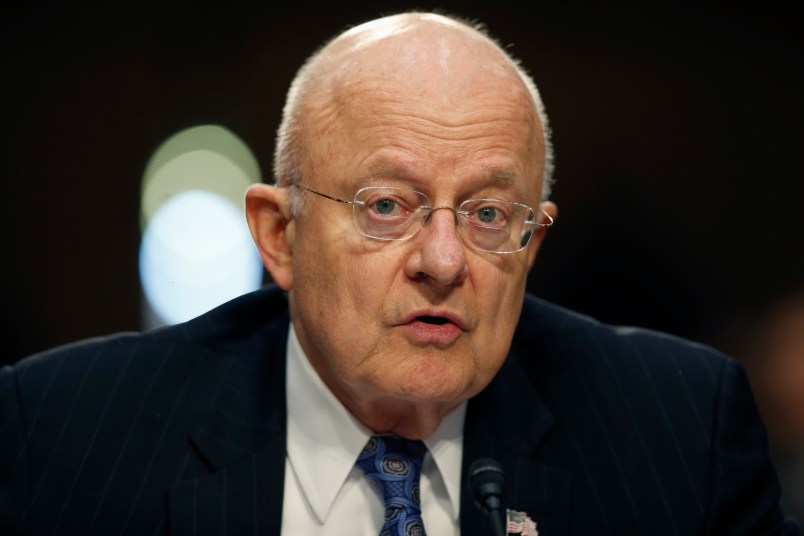U.S. government officials on Friday officially accused the Russian government of hacking email systems belonging to various American political organizations in order to influence the November election.
“The U.S. Intelligence Community (USIC) is confident that the Russian Government directed the recent compromises of e-mails from US persons and institutions, including from US political organizations,” a joint press release from the Director of National Intelligence and Department of Homeland Security reads. “The recent disclosures of alleged hacked e-mails on sites like DCLeaks.com and WikiLeaks and by the Guccifer 2.0 online persona are consistent with the methods and motivations of Russian-directed efforts.”
“These thefts and disclosures are intended to interfere with the US election process,” it continues. “Such activity is not new to Moscow—the Russians have used similar tactics and techniques across Europe and Eurasia, for example, to influence public opinion there. We believe, based on the scope and sensitivity of these efforts, that only Russia’s senior-most officials could have authorized these activities.”
While the statement acknowledged that some states “have also recently seen scanning and probing of their election-related systems” and that activity “in most cases originated from servers operated by a Russian company,” it said the intelligence community was “not now in a position to attribute this activity to the Russian Government.”
In July, hacked emails leaked to Wikileaks revealed that Democratic National Committee staffers had criticized and mocked Democratic candidate Bernie Sanders. In early September, Russian President Vladimir Putin had said of the DNC hack, “I don’t know anything about it, and on a state level Russia has never done this.”
Later in July, the Democratic Congressional Campaign Committee, which allocates party funds to congressional candidates nationwide, confirmed a similar cyber attack to that of the DNC.
More recently, voter registration databases in Arizona and Illinois were reportedly breached by foreign hackers, prompting the FBI to urge all states to beef up cybersecurity efforts.
Read the full press release below:
The U.S. Intelligence Community (USIC) is confident that the Russian Government directed the recent compromises of e-mails from US persons and institutions, including from US political organizations. The recent disclosures of alleged hacked e-mails on sites like DCLeaks.com and WikiLeaks and by the Guccifer 2.0 online persona are consistent with the methods and motivations of Russian-directed efforts. These thefts and disclosures are intended to interfere with the US election process. Such activity is not new to Moscow—the Russians have used similar tactics and techniques across Europe and Eurasia, for example, to influence public opinion there. We believe, based on the scope and sensitivity of these efforts, that only Russia’s senior-most officials could have authorized these activities.
Some states have also recently seen scanning and probing of their election-related systems, which in most cases originated from servers operated by a Russian company. However, we are not now in a position to attribute this activity to the Russian Government. The USIC and the Department of Homeland Security (DHS) assess that it would be extremely difficult for someone, including a nation-state actor, to alter actual ballot counts or election results by cyber attack or intrusion. This assessment is based on the decentralized nature of our election system in this country and the number of protections state and local election officials have in place. States ensure that voting machines are not connected to the Internet, and there are numerous checks and balances as well as extensive oversight at multiple levels built into our election process.
Nevertheless, DHS continues to urge state and local election officials to be vigilant and seek cybersecurity assistance from DHS. A number of states have already done so. DHS is providing several services to state and local election officials to assist in their cybersecurity. These services include cyber “hygiene” scans of Internet-facing systems, risk and vulnerability assessments, information sharing about cyber incidents, and best practices for securing voter registration databases and addressing potential cyber threats. DHS has convened an Election Infrastructure Cybersecurity Working Group with experts across all levels of government to raise awareness of cybersecurity risks potentially affecting election infrastructure and the elections process. Secretary Johnson and DHS officials are working directly with the National Association of Secretaries of State to offer assistance, share information, and provide additional resources to state and local officials.







Trump: I am more impressed by Putin than before. This is how its done.
Pence: I wish I was a Russian. That is leadership. Putin would make a great POTUS.
Start at the top.
Go after the ringleader.
Subpoena / indict / convict Drumpf.
How long before HO tweets that this is all part of the “rigged” election? In 3…2…1…
Glad to see this.
I think it’s time the US and our allies return the favor - something to let Russia know they’re not the only ones who can play this game. Maybe something like a 3-day nationwide power or internet outage would be appropriate. I don’t see how we’re protecting our national interests when Russia attacks us, and we do nothing but whine about it.